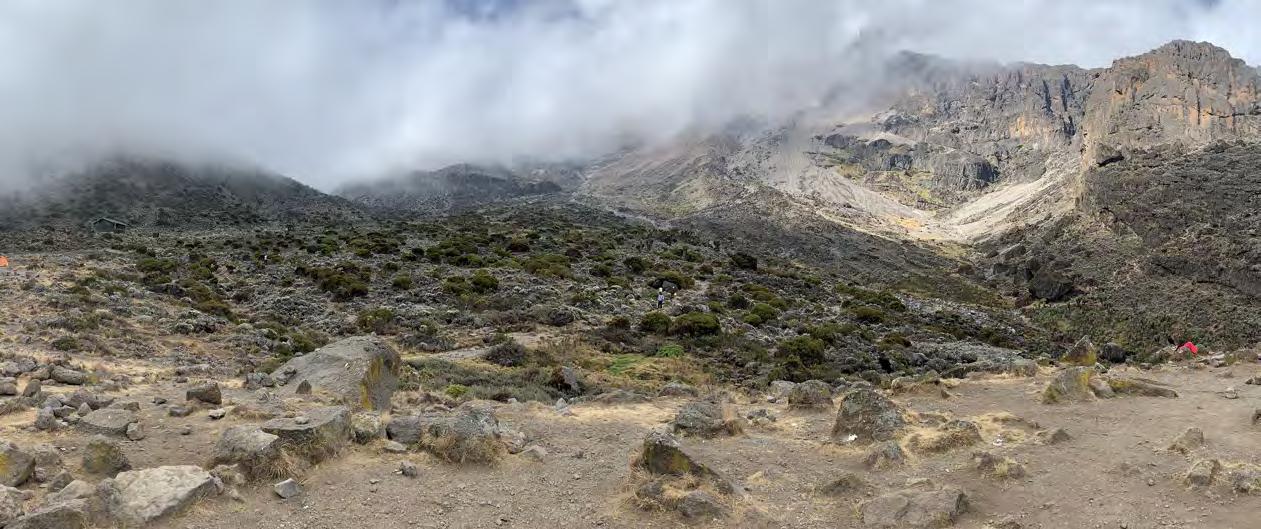
10 minute read
Making it Happen
Climbing for a Cause
| BY SOPHIE DINGLE
It was midnight at Kosovo camp, 16,300 feet up Mount Kilimanjaro, when Colby Bowers and his group awoke. They got dressed, gathered their equipment and set out to climb the last two miles of the mountain. For hours, the group of men proceeded to trek through switchbacks in the middle of the night, guided by their headlamps, pushed forward by sheer determination.
With 0.9 miles to go, they hiked across glaciers. The sun rose behind them, illuminating the shadow of the mountain on the clouds below.
And then, the summit.
“Emotion and a sense of accomplishment were the first things I felt,” Colby says. “After all the trials, tribulations, hurdles and roadblocks – we made it.”
Colby Bowers is a retired Air Force senior noncommissioned officer with over 23 years of service. He was deployed nine times to different locations, including multiple tours in Afghanistan and Iraq, during which he developed chronic PTSD and suffered multiple traumatic brain injuries, or TBI.
It was in 2005 that he first realized something was wrong.
“I would lose things in my house, only to find them a few days later and have no recollection of how they got here,” he explains.
Tripping, clumsiness, losing his bearings and losing his train of thought mid-sentence were all signs that something was wrong – but a diagnosis was years away. After bouncing around from neurologists, psychologists and physical therapists, it wasn’t until 2012 that he visited the National Intrepid Center of
Excellence and finally received a diagnosis: mild traumatic brain injury and chronic post-traumatic stress. Due to his balance issues, Colby would often fall and hit his head, worsening his condition. He couldn’t drive, walked with a cane, and couldn’t hold his young son, Brayden, for long periods of time. A year into his retirement, he was accepted as a patient at the Marcus Institute for Brain Health in Denver, and was able to get a new lease on life. Today, he no longer walks with a cane and his memory loss is more manageable. With a desire to help others in a similar situation, he and his wife, Kerrie, dreamed of creating a nonprofit that would help veterans and first responders deal with trauma and get the resources that they would need COURTESY PAPER CRANE FOUNDATION to do so. In March of 2020, they launched the Paper Crane Foundation with the goal of furthering research into TBI and PTSD, increasing awareness and empowering those suffering from these conditions to rebuild their lives. Their main objective is to aid in creating a system where TBI is accurately diagnosed at Colby Bowers and fellow Paper Crane Foundation climbers the onset of the injury in order to draw near to Kilimanjaro’s summit. provide the injured person with early treatment and avoid suffering a disability. The foundation is working to identify medical equipment that can accurately provide an early diagnosis within minutes, and their hope is to begin clinical testing in the coming year. For the foundation, the expedition to Mount Kilimanjaro provided an opportunity not only to conduct field research and gather data, but also to inspire.
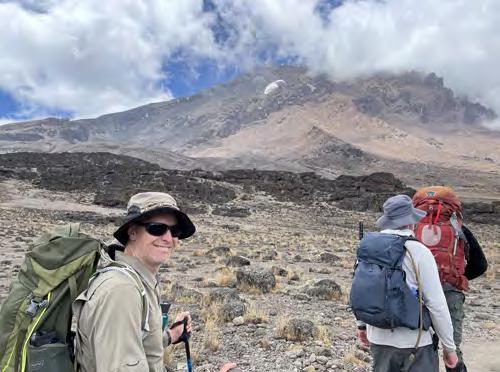

The Paper Crane Foundation camp in the clouds near the summit of Kilimanjaro.
Traveling with Colby were three other veterans, one active-duty military member, and a current Steamboat Springs firefighter and paramedic, Chris Welch, who is also on the board of the foundation.
It was a group that became close in the year leading up to the climb – training together by climbing 14ers across the state – and even closer as they safely returned to basecamp after safely summiting the 19,341-foot Tanzanian mountain.
“Most research about TBI is done in a lab,” Colby explains. “And that’s great, but it’s important to do field research too. The fact that we were able to do that is one way that we want to further our cause.”
As the foundation furthers its mission, and with one expedition under its belt, Colby and Kerrie will turn their attention to research.
“A year from now, I hope we’re in the first stages of clinical research,” Kerrie says. “It takes some time to start that, and we need to find the right institutions and the right people to work on the project, but we’re moving in the right direction.”
PINE MOON
fine art
a broad range of inspiring & unique fine art by local artists
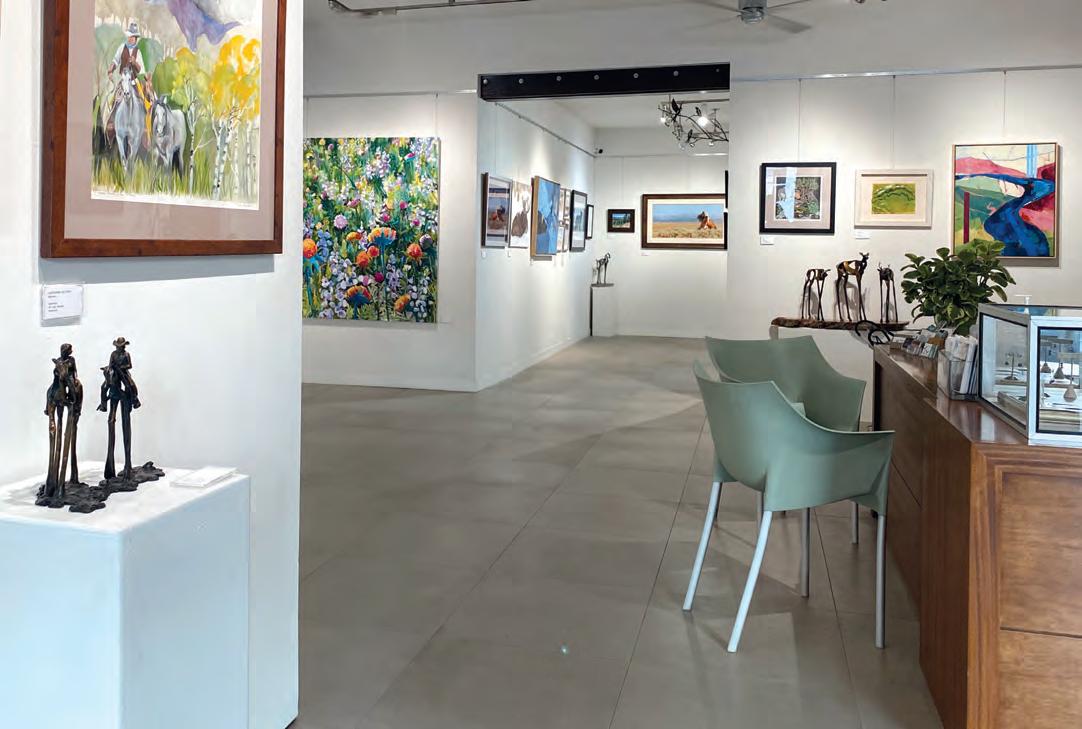
WWW.PINEMOONFINEART.COM
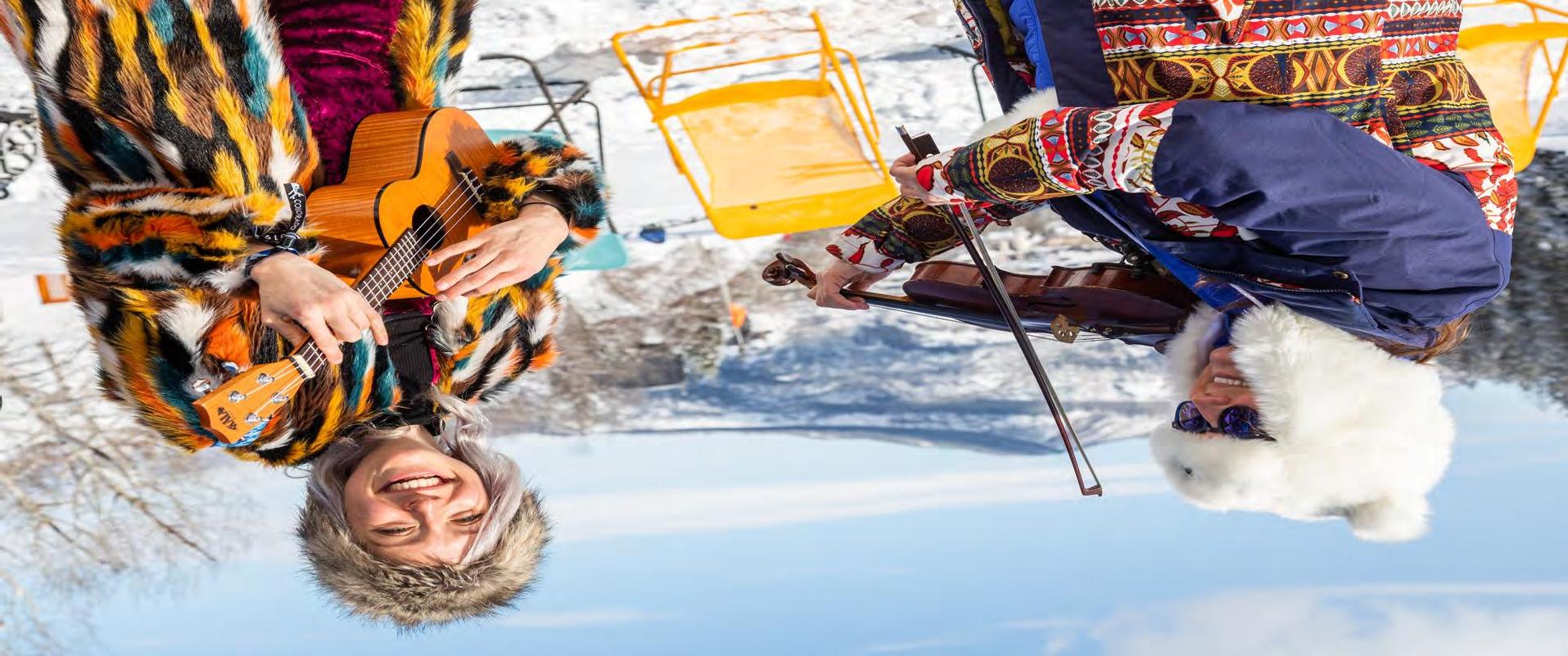
An Eagle Eye on the World
| BY SUZI MITCHELL
When VF Corporation announced it was going to sunset its Eagle Creek label by the end of 2021, there was widespread disappointment from the luggage brand’s loyal following. Among those who did not want to see it disappear was Travis Campbell, a Steamboat Springs local and president of emerging brands for VF Corp. After mulling over the news with his wife, Jenny, he made an offer to buy it. “Jenny basically gave me a nudge – to her the decision was an obvious one,” he says.
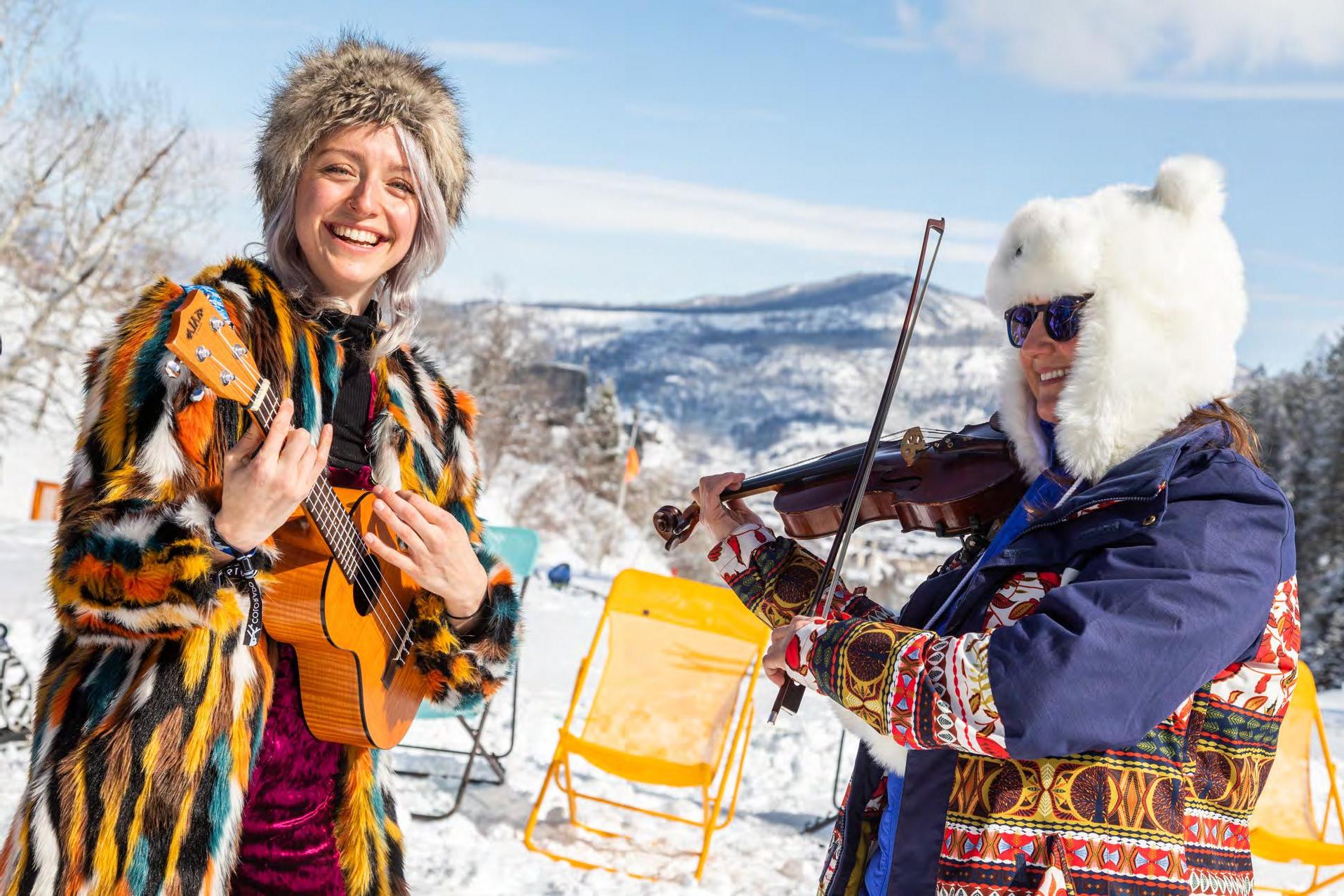
Travis plans to make Steamboat the headquarters for Eagle Creek. “I joke that at some level I have basically bought myself a job so we can stay here,” Travis says, laughing. “If I didn’t want to be here, I probably would not have made the same decision.”
The couple intentionally aligned career choices with their lifestyle. They hankered to call Steamboat home, and that yearning came to fruition when he was offered the role of president at Smartwool in 2017. “We’ve always been in a place where we feel a strong sense of community and have easy access to the outdoors,” he says. Before Steamboat, their longest stint was 16 years on Bainbridge Island, a stone’s throw from his upbringing on a horse farm in Washington state. “I think I have a bias towards rural landscapes,” Travis says.
Like both of their parents, the Campbells value travel as an educational tool for their two teenage children. “Travel offers immense societal benefits and breaks down walls to better understand each other,” Travis says. He counts Eurorailing for eight weeks when he was 17 years old as one of the best things he’s done. “Exposing us to the broader world was important to my parents,” he says. “When I told them I bought the business, Mom unearthed my brother’s backpack from an exchange trip he made to Russia at age 12, with the luggage tag still attached. It was an Eagle Creek.”
The brand was launched in 1975 by Nona and Steve Barker with $2,500 in the bank while the couple kept their day jobs. “With an incredible team of talented ‘Creekers,’ we grew the brand into the internationally recognized leader in the travel gear category before selling to VF in 2007,” Steve says. He and Travis served on the Outdoor Industry Association board of directors and shared a common bond of fly fishing and love of the outdoors. “When Nona and I heard the news that VF had decided to shutter the brand due mainly to COVID’s impact on travel, we were devastated,” Steve continues. “The announcement that Travis had acquired the brand and is locating in Steamboat was a great relief. We believe Eagle Creek and international adventure travel COURTESY VF CORPORATION will see a great renaissance post-COVID and we’re very excited for the brand and Travis.” Travis is tasked with building his team from scratch as the purchase did not include current employees. “It’s going
Steamboat Springs local and new owner of Eagle Creek Travis Campbell. to be a challenge for sure,” he says. “Would I like to have everyone based here? Of course, but I appreciate that is not viable for a host of reasons.” He plans to capitalize on technology and the emergence of a hybrid workforce model. He aligns much of the ethos he plans to instill at Eagle Creek with that of Smartwool. “We had a strong culture that was very much based on this incredible sense of community and giving back,” he says. Eagle Creek is synonymous with adventure travel, but Travis sees an opportunity to inspire travelers closer to home. “Visitors to our public lands have grown exponentially and we have an obligation as an industry to convert these people into advocates to protect and improve our outdoor spaces for the future,” he says. “I have been fortunate to work in a business where my personal interests and passions align,” Travis says. “It’s an amazingly privileged position and I intend to do everything I can to give back and inspire the next generation of travelers.”



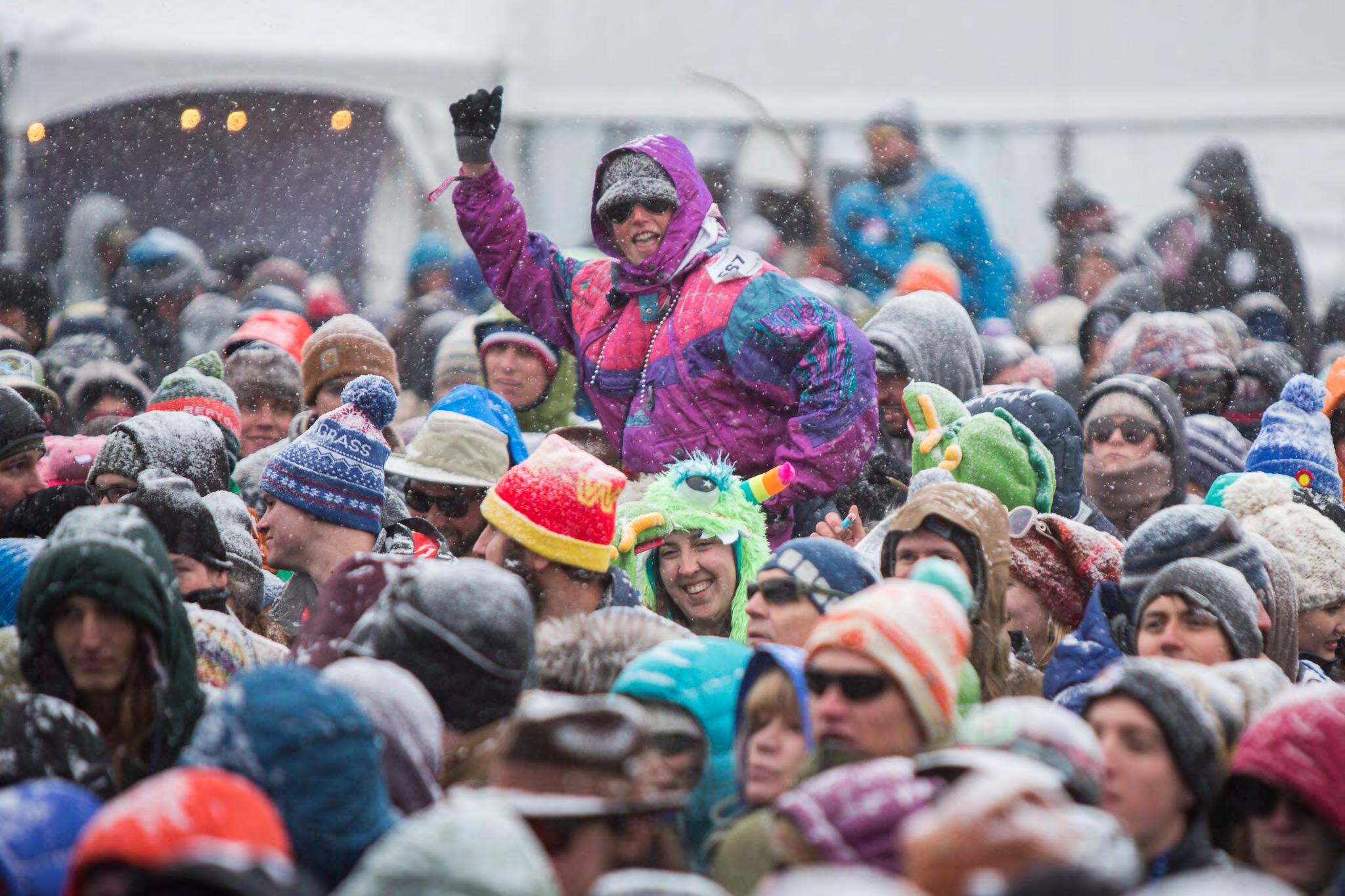



| BY SUZI MITCHELL
Alex Hall, the son of Town Hall Outdoor Co. co-founder Robin Hall, tests out winter apparel with his friend, Sophia Tirone.
Kids About Town
On a summer’s day in Steamboat Springs, a group of kids gather around a table in Stehley Park. Despite the fact that this enthusiastic crew munches on watermelon and sips lemonade, their minds are on winter, and the excitement is evident. They have been tasked to discuss something they all have in common – what makes the perfect winter gear?
Beside them sits Robin Hall, the mother of two boys in the group and a co-founder of newly formed Town Hall Outdoor Co., the latest in a substantial lineup of outdoor gear and accessory brands based in Steamboat. Hall is no stranger to the industry. She served in a myriad of roles over her 11 years with Smartwool, most recently as the director of sustainability.
She, along with co-founders and Steamboat locals Jay Lambert and Joe Solomon, saw a niche in outdoor apparel. “There is only one other company in the U.S. that specializes solely in kids,” Hall says. The difference with Town Hall will be their commitment to sustainability. Their first collection this fall was made from recycled materials, except for zippers and Velcro. The goal is to make clothing that stands the test of time with all product materials being recycled by 2024. “Hand-me-downs, or hand-me-ups as we prefer to say, should be coveted and passed along with epic tales of adventure that keep going,” Hall says.
Town Hall will sell apparel directly to the consumer, at least for the foreseeable future. “We want to have a personalized connection with our customers as much as possible,” Hall says.
The trio made a commitment to work with local This is such a talent when the opportunity arises. “A lot of people are doing great things in this corner of the state, and labor of love – it we are lucky to have a wealth of resources here in brings together Steamboat.” Hall has been one of the cornerstones in a new grassroots initiative for outdoor gear companies kids, community to network and engage, started by the Economic and the planet. Development Council. “What we are doing essentially speeds up the business cycle, especially for startups in the industry,” says John Bristol, director of economic development at the Steamboat Springs Chamber. “It’s a very supportive group who are willing to share nuggets of advice on everything from production to shipping, and that community-mindedness aligns with Robin.” One of the industry’s greatest assets in Steamboat is the number of willing product testers on hand. “You will hear folks in the grocery stores and the post office line talking about outdoor gear,” Bristol says, laughing. Town Hall’s first line of insulated jackets and pants passed a series of tests, from rolling in dirt in aspen groves and brush to being stepped on with skis. “This is such a labor of love – it brings together kids, community and the planet,” Hall says. There is a synergy between the company ethos and being outside. “The outdoors is a great equilibrium. It’s a place where anyone can be.” This ideal inspired the name for the business. “A town hall is where everyone, regardless of background, size, shape, race, color or age, can gather and use their voice,” says Hall. “It’s the same outdoors and we wanted our brand to reflect this.”










